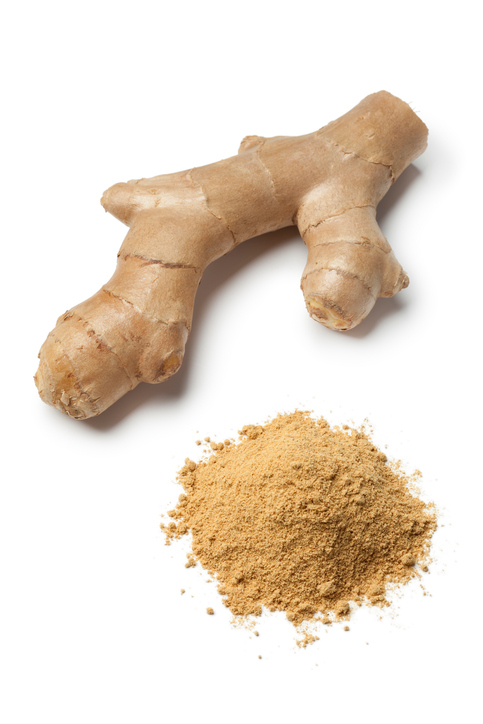 Many people with diabetes incorporate alternative supplements as part of their nutritional intake and health-seeking lifestyle. Historically ginger was used as a home remedy to treat stomach aches, diarrhea, and nausea. Today many people use ginger as a dietary supplement for nausea associated with motion sickness or chemotherapy; rheumatoid arthritis; and osteoarthritis. There is clinical evidence that suggests ginger has beneficial effects against metabolic syndrome – a major risk factor for type 2 diabetes. However, before you start swallowing capsules filled with ginger you should know exactly what you are getting into.
Many people with diabetes incorporate alternative supplements as part of their nutritional intake and health-seeking lifestyle. Historically ginger was used as a home remedy to treat stomach aches, diarrhea, and nausea. Today many people use ginger as a dietary supplement for nausea associated with motion sickness or chemotherapy; rheumatoid arthritis; and osteoarthritis. There is clinical evidence that suggests ginger has beneficial effects against metabolic syndrome – a major risk factor for type 2 diabetes. However, before you start swallowing capsules filled with ginger you should know exactly what you are getting into.
What is ginger?
Ginger is a tropical plant that has a fragrant underground stem called a rhizome – the ginger root. It is widely used as a flavoring in foods, beverages, soaps, and cosmetics.
Does it work?
“Research has shown that the benefits of ginger reach far beyond a home remedy for nausea,” says Robin Foroutan, MS, RDN, Integrative Dietitian and Spokesperson for the Academy of Nutrition and Dietetics. “Eating ginger improved insulin sensitivity and blood sugar balance, plus improved blood pressure and endothelial [the layer of cells that line blood vessels] function in people with type 2 diabetes,” Evidence shows eating ginger can increase thermogenesis (metabolism) and reduce hunger. “Supplementing with ginger extract was also found to be beneficial for weight loss, hip circumference and reduced hunger in overweight and obese adult participants,” says Foroutan.
What are the sources of ginger?
Common forms of ginger include the fresh or dried root, tablets, liquid extracts, and teas. “Ginger is also available as a powder for culinary use, and in capsules for those seeking a concentrated dose,” says Foroutan.
What is a typical dose?
In research studies, participants took between 1000 – 3000 mg of ginger extract. According to Foroutan, typical doses may range between 500mg to 1000mg up to 3 times per day depending on the health concern and effect you're trying to gain. You should consult with your healthcare provider or registered dietitian nutritionist who is knowledgeable about alternative supplements.
What about ginger spice?
When used as a spice, ginger is thought to be generally safe. Foroutan advises you to “Eat it! Ginger is delicious and great for you! It's an excellent way to add flavor to food without adding sugar.
So, are the benefits worth the risk?
When used as a spice, ginger is thought to be generally safe. Although, in some people, ginger can have mild side effects such as abdominal discomfort, heartburn, diarrhea, and gas.
“Ginger can support healthy circulation by inhibiting platelet ‘stickiness,’ which can be beneficial for cardiovascular disease and may help reduce the risk of stroke," says Foroutan. However, concerns have been raised by some experts that ginger might interact with anticoagulants – blood thinners.
Although ginger can promote healthy digestion, it may interfere with gallstone disease. Foroutan says "Ginger helps to stimulate digestive enzymes and increases bile production and secretion, which can be really helpful for healthy digestion.” But the increased bile production can also increase gallstones.
Bottom Line? If you are on a blood-thinning medication or have any medical condition, including diabetes, you should speak to your healthcare provider or registered dietitian nutritionist – who is experienced in herbs and dietary supplements, before taking high doses of ginger extract. Click here to find a registered dietitian nutritionist in your area.
It’s a good idea to tell all your health care providers about any alternative supplements or home remedies you use. Give them a full picture of what you do to manage your health. This will help ensure coordinated and safe care.
 Constance Brown-Riggs, MSEd, RD, CDE, CDN is a registered dietitian, certified diabetes educator, national speaker and author of The African American Guide to Living Well with Diabetes.. She is Dannon One Yogurt Every Day Nutrition Advisor.
Constance Brown-Riggs, MSEd, RD, CDE, CDN is a registered dietitian, certified diabetes educator, national speaker and author of The African American Guide to Living Well with Diabetes.. She is Dannon One Yogurt Every Day Nutrition Advisor.









